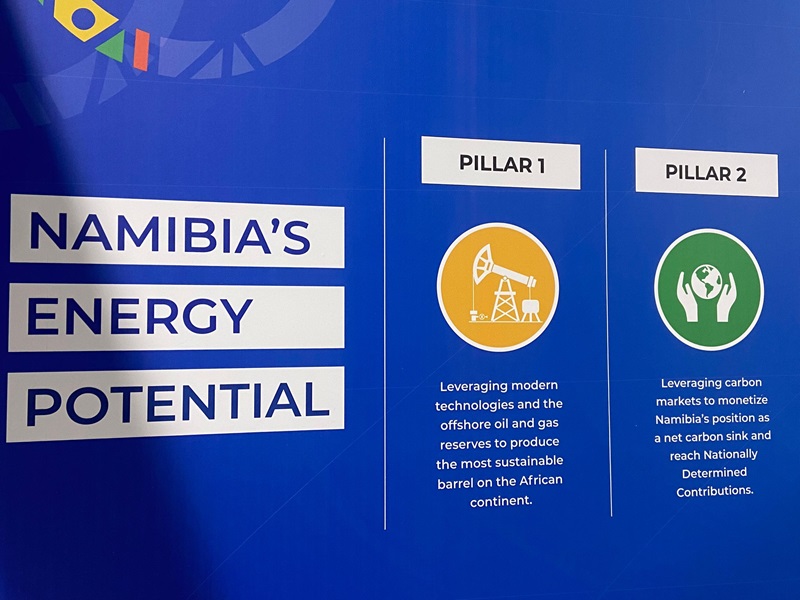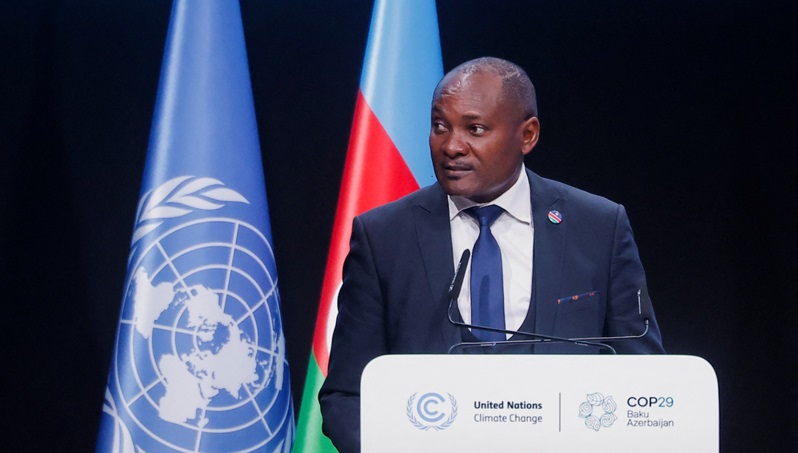While Namibia says it can succeed where others have failed in using oil and gas to help its people, experts and campaigners are sceptical
At the COP28 climate summit in Dubai, almost all the world’s countries agreed to transition away from fossil fuels in energy systems. But, one year later at COP29, Namibia has been looking for oil and gas investments at its country pavilion in Azerbaijan’s capital Baku.
The state-run Namibia Investment Promotion and Development Board (NIPDB) organised side events with a focus on “producing the most sustainable barrel of crude oil” and another on “how to green Namibia via industrialisation and oil and gas value chain”.
The pavilion displayed its 2024-2025 investment opportunity catalogue which advocates for developing the country’s nascent oil and gas sector.

Namibia’s pavilion at COP29 (Photo: Vivian Chime)
In the foreword, the country’s minister of industrialisation and trade, Lucia Lipumbu, described the catalogue as being “reflective” of the southern African country’s “vision for the future”, adding that its economic potential has never been more promising, in light of major developments – “particularly in the oil and gas and renewable energy spaces”
Will GDP double?
In the oil and gas section of the catalogue, the country claims that current exploration for petroleum in four frontier basins – Namibe, Walvis, Lüderitz and Orange – will lead to a doubling of the country’s gross domestic product (GDP) by 2040, if found to be commercially viable.
It also states that the country is partnering with Norwegian company BW Energy to develop the Kudu Gas fields, adding that the gas reserves “have the potential to transform Namibia into a net electricity exporter through gas-to-power production”.
Additionally, the government says that offshore oil exploration along its 1,600km-long coastline has seen a “significant uptick in interest”, with oil majors such as TotalEnergies, Shell, Galp and QatarEnergy actively pursuing interests along the coastline.

A wall display at Namibia’s pavilion at COP29 (Photo: Vivian Chime)
Vance Culbert, senior policy advisor in the energy program at the International Institute of Sustainable Development (IISD), said he doubted that Namibia’s GDP would double. The nature of investment deals requires “the payback of investments to the companies” – and thus will make it difficult for the country to accrue any short-term benefits, especially in the face of the transition, he said.
Mohamed Adow of Power Shift Africa holds similar views, telling Climate Home that while ‘increased GDP’ can be a tempting tagline, the reality behind that GDP number is that fossil fuels orient the economy toward extractive industries which privilege profit and foreign markets over delivering real prosperity and development for ordinary Namibians.
Resource curse
Furthermore, the Namibian government states in its investment catalogue that it is “cognisant of the potential pitfalls that are associated with discoveries of valuable natural resources”, adding that it has drawn lessons from the experiences of oil-producing countries and will effectively manage the new sector to ensure economic benefits for all Namibians.
Fadhel Kaboub, a senior advisor with Power Shift Africa, is doubtful that Namibia can succeed where others have failed. He said that if oil and gas were a source of development and prosperity, Nigeria and Angola “would be economic powerhouses delivering aid and development to their neighbours”.
Nigeria, a country of over 200 million people, continues to be energy poor despite having the second largest oil and gas reserve in Africa. The country has struggled to use its abundant natural resources to benefit its people and drive economic development, and is instead beset by poverty and corruption.
Coalition against fossil fuel subsidies expands but misses initial targets
The Niger Delta region of the country where most of the oil drilling takes place has suffered years of environmental degradation, and pollution to its waters and farmlands, leaving its people poor and facing health problems.
Kaboub said Namibia risks “falling into the same trap” – and this would have devastating impacts on the environment and people, bringing no economic development.
Ina-Maria Shikongo, a Namibian climate activist, said these impacts
Read More

